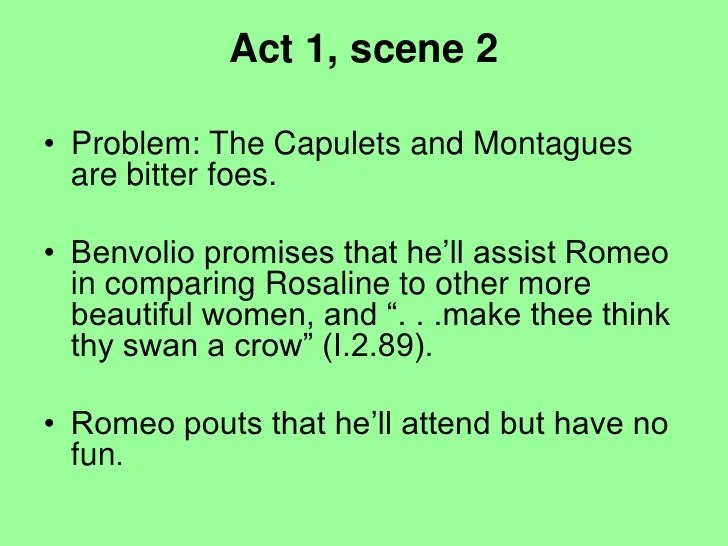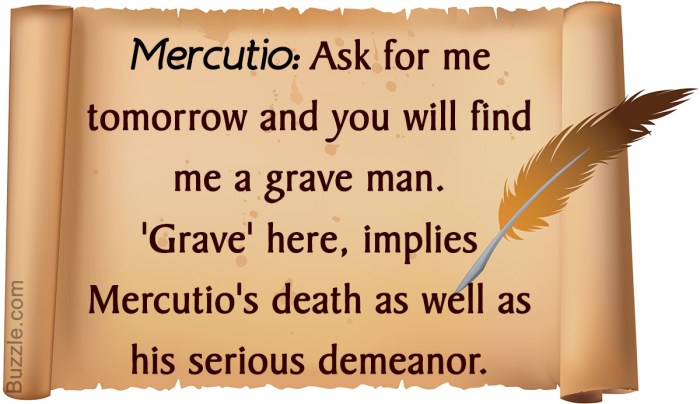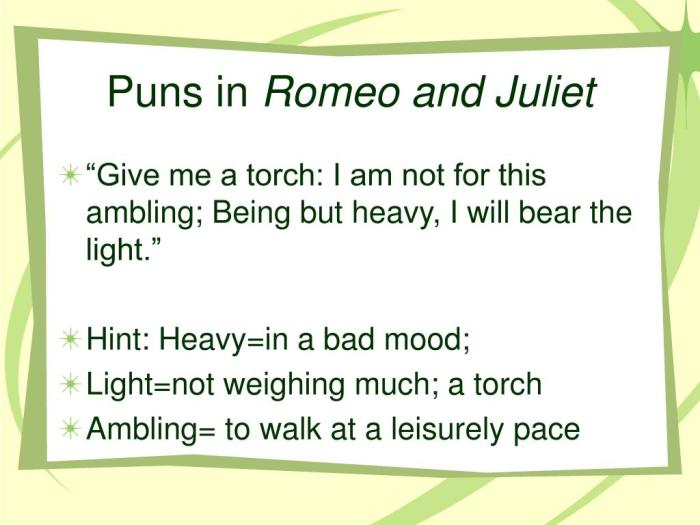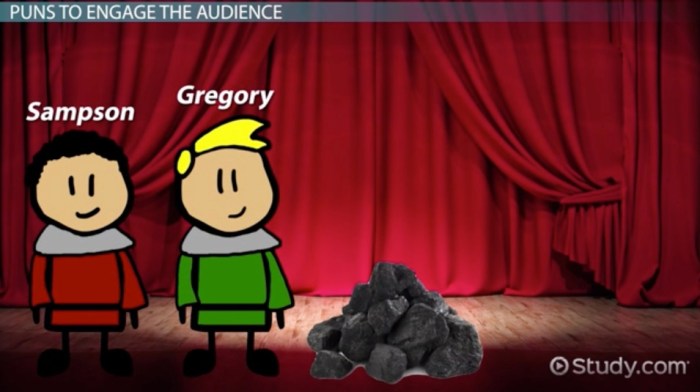Romeo and juliet puns act 1 – Embarking on a literary journey through Romeo and Juliet Act 1, we delve into the captivating realm of puns and wordplay. These linguistic devices, skillfully employed by Shakespeare, add a layer of wit and humor to the tragic love story, offering fresh insights into the characters and themes.
As Romeo and Juliet exchange their first words, a playful banter ensues, marked by clever puns that hint at their budding affection. Romeo’s use of puns, in particular, reveals his quick wit and charming nature, while Juliet’s responses demonstrate her intelligence and wit.
Puns and Wordplay in Act 1

Act 1 of Romeo and Juliet is replete with puns and wordplay, employed by Shakespeare to create humor, foreshadow events, and reveal character traits. These linguistic devices add depth and richness to the play, enhancing the audience’s understanding and enjoyment.
One notable instance of wordplay occurs when Romeo laments his love for Rosaline, stating, “She will not stay the siege of loving terms, / Nor bide the encounter of assailing eyes.” The use of “siege” and “encounter” evokes the language of warfare, suggesting that Romeo’s attempts to woo Rosaline are akin to a military campaign.
This foreshadows the tragic conflict that will later engulf the lovers.
Use of Puns to Foreshadow Events
- “I’ll go along, no such sight to be shown, / But to rejoice in splendor of mine own.”(1.1.232-233) – Mercutio’s pun on “sight” and “light” foreshadows Romeo’s encounter with Juliet at the Capulet ball, where she is described as a “bright angel.”
- “Tybalt, the reason that I have to love thee / Doth much excuse the appertaining rage / To such a greeting.”(1.5.94-96) – Tybalt’s wordplay on “reason” and “rage” hints at the upcoming clash between the Montagues and Capulets, foreshadowing the violence that will follow.
Puns to Reveal Character Traits
- “If thou art Romeo, throw not from thy name, / For thou art thyself, though not a Montague.”(2.2.52-53) – Juliet’s pun on “name” and “Montague” reveals her willingness to overlook Romeo’s family affiliation and embrace his true identity.
- “My lips, two blushing pilgrims, ready stand / To smooth that rough touch with a tender kiss.”(1.5.97-98) – Romeo’s personification of his lips as “pilgrims” and the juxtaposition of “rough” and “tender” reflect his romantic nature and his desire to reconcile the conflict between the two families.
Romeo’s Puns

Romeo’s puns in Act 1 of Romeo and Juliet reveal his wit and wordplay skills, contributing to his characterization as a romantic and passionate young man. Through his puns, Romeo demonstrates his ability to find humor even in the midst of love and conflict.
Puns Made by Romeo
- “I am too sore enpierced with your shaft”(1.1.224): This pun plays on the double meaning of “shaft,” referring both to Cupid’s arrow and to a spear or arrow. It suggests Romeo’s deep emotional pain and vulnerability.
- “I have no other wit, but to curse the wind, / Which blows the tenure of my heart away”(1.1.168-169): Romeo puns on the word “tenure,” which can mean both “holding” and “lease.” He suggests that the wind is taking away his love, Rosalind, who he has only recently met.
- “Is love a tender thing? it is too rough, / Too rude, too boisterous, and it pricks like thorn”(1.1.174-175): Romeo puns on the word “pricks,” which can mean both “pierces” and “irritates.” He compares love to a thorn, suggesting that it can be both pleasurable and painful.
Characterization and Development
Romeo’s puns highlight his playful and imaginative nature. They reveal his ability to find humor in even the most difficult situations, such as his unrequited love for Rosalind. His puns also demonstrate his intelligence and wit, making him an attractive character to the audience.
As the act progresses, Romeo’s puns become less frequent, indicating his growing maturity and seriousness. This shift in his language reflects his evolving emotional state as he falls in love with Juliet.
Juliet’s Puns

Juliet’s puns in Act 1 of Romeo and Juliet showcase her wit and playful nature. These puns reveal her ability to find humor in even the most serious situations, highlighting her resilience and adaptability.
Juliet’s puns also reflect her budding relationship with Romeo. Her use of wordplay and humor creates a sense of intimacy and connection between them, as they share a mutual appreciation for clever language.
Example of Juliet’s Pun
One of Juliet’s most notable puns occurs when she first meets Romeo at the Capulet’s ball. As Romeo asks her name, Juliet replies, “If you do love me, know I am no other / Than such a one whom you have lately loved.”
This pun hinges on the word “love,” which can refer to both romantic affection and family ties. Juliet cleverly plays on this ambiguity, suggesting that she is both a new love interest for Romeo and a relative (the Capulets and Montagues are distant cousins).
Juliet’s Puns as a Reflection of Her Character
Juliet’s puns demonstrate her quick wit and ability to think on her feet. She uses wordplay to deflect unwanted advances, such as when she tells Paris, “You are a gentleman, and I a lady; but I am a great deal better than you.”
This pun not only asserts her superiority but also highlights her independent spirit.
Juliet’s Puns and Her Relationship with Romeo
Juliet’s puns create a playful and intimate atmosphere between her and Romeo. Their shared love of wordplay suggests a deep connection and mutual understanding. Juliet’s puns also serve as a way for her to express her feelings for Romeo, as she cannot openly declare her love due to the feud between their families.
Thematic Connections

The puns in Romeo and Julietare not just silly wordplay; they serve a deeper purpose, reflecting the play’s central themes and contributing to its overall meaning and message.
One of the play’s most prominent themes is the conflict between love and hate. The puns often highlight this tension, showing how easily love can turn into hate and vice versa. For example, when Romeo first sees Juliet, he exclaims, “Did my heart love till now? For I ne’er saw true beauty till this night.”
This pun on the word “heart” suggests that Romeo’s previous relationships were not true love but merely infatuations. However, when he meets Juliet, his heart truly begins to beat for the first time.
Puns and the Tragic Flaw
The puns in the play also shed light on the tragic flaw of the main characters. Romeo and Juliet are both young and impulsive, and their actions are often driven by their emotions rather than reason. This is reflected in the many puns they make that involve wordplay and double entendres.
For example, when Romeo and Juliet first meet, they exchange a series of puns that hint at their future love affair. Romeo says, “If I profane with my unworthiest hand this holy shrine, the gentle sin is this: my lips, two blushing pilgrims, ready stand to smooth that rough touch with a tender kiss.”
This pun on the word “kiss” foreshadows the passionate love that will develop between Romeo and Juliet. However, it also hints at the tragic consequences of their love, as their relationship is ultimately doomed to failure.
Dramatic Impact: Romeo And Juliet Puns Act 1
The puns in Act 1 of Romeo and Juliet play a significant role in shaping the play’s dramatic impact. They create humor, tension, and foreshadowing, adding depth and complexity to the story.
Humor:The puns provide comic relief amidst the play’s tragic events. They create moments of levity, allowing the audience to laugh and release some of the tension.
Tension:Puns can also create tension by highlighting the characters’ contrasting emotions and perspectives. For example, Romeo’s pun on “star-crossed” foreshadows the tragic fate of the lovers.
If you’re a fan of Romeo and Juliet puns, then you’ll love this math riddle: what plus what equals 25? Check it out and see if you can solve it! And don’t forget to come back for more Romeo and Juliet puns, including some of the best from Act 1.
Foreshadowing:Many of the puns in Act 1 foreshadow future events. For instance, Mercutio’s pun on “Tybalt’s a rat” foreshadows the fatal duel between Tybalt and Romeo.
Use of Wordplay, Romeo and juliet puns act 1
The puns in Act 1 are often used to convey multiple meanings. This wordplay adds depth and richness to the dialogue, allowing the characters to express their thoughts and emotions in a clever and nuanced way.
For example, Romeo’s pun on “O, then, I see Queen Mab hath been with you” refers both to the fairy queen and to Juliet’s beauty, creating a playful and romantic moment.
Dramatic Irony
The use of puns also contributes to the play’s dramatic irony. The audience understands the full meaning of the puns, while the characters often do not. This creates a sense of suspense and anticipation, as the audience waits for the characters to realize the significance of the wordplay.
For instance, Romeo’s pun on “Tybalt, the rat-catcher” is ironic because Romeo does not yet know that Tybalt will be the one to kill Mercutio.
Comparative Analysis
The use of puns in Act 1 of Romeo and Juliet differs significantly from their use in other acts of the play. In Act 1, puns are employed primarily for comedic effect, creating a light-hearted atmosphere and establishing the characters’ wit and wordplay.
Frequency and Nature of Puns
The frequency of puns in Act 1 is noticeably higher than in subsequent acts. This is likely due to the play’s initial focus on the courtship and romance between Romeo and Juliet. The playful banter and wordplay between the young lovers serve to emphasize their connection and mutual attraction.
The nature of the puns in Act 1 is also distinct. Many of the puns are based on wordplay and double entendres, with characters using language to create humorous effects. For example, Romeo’s line, “If I profane with my unworthiest hand / This holy shrine, the gentle sin is this,” uses the word “profane” to create a double meaning, referring both to Romeo’s touch and to his lack of worthiness.
In contrast, the puns in later acts of the play become more serious and somber. They often reflect the characters’ emotional states and the tragic events that unfold. For instance, in Act 5, Romeo’s line, “O, here / Will I set up my everlasting rest,” foreshadows his death and the play’s tragic conclusion.
Thus, the use of puns in Romeo and Juliet evolves throughout the play, reflecting the changing tone and themes. The comedic puns in Act 1 establish the characters’ wit and romance, while the more serious puns in later acts foreshadow the tragic events and convey the characters’ emotional turmoil.
Key Questions Answered
What is the significance of puns in Romeo and Juliet Act 1?
Puns add humor, create characterization, explore themes, and foreshadow events in the play.
How do Romeo’s puns reveal his character?
Romeo’s puns demonstrate his wit, charm, and romantic nature.
What is the dramatic impact of the puns in Act 1?
The puns create tension, foreshadow events, and provide comic relief.